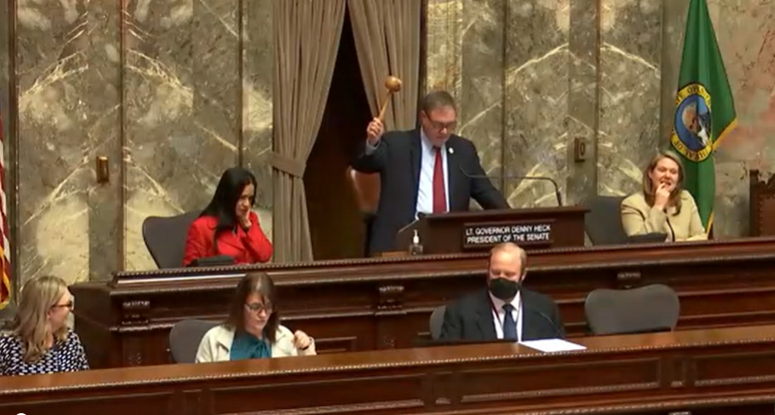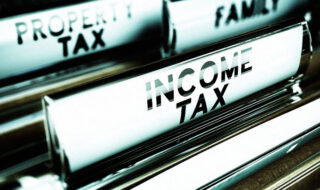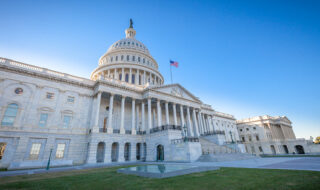Topics:
February 17, 2023
First Legislative Deadline of the Session Passes
State Director Patrick Connor reports from Olympia on the small-business agenda for the legislative and political week ending February 17
Small Business Day, March 16 NFIB’s annual Small Business Day at the Capitol will be held Thursday, March 16. Click here for additional information or to register. Sponsorships are still available. Contact Stacy Jenkins at 360-870-7749 or Stacy.Jenkins@NFIB.org for details. Legislative Action Friday, February 17, marked the session’s first committee cut-off. Bills that failed to win approval in a policy committee are generally considered dead for the year. About a half-dozen bills of interest to NFIB and its small-business-owning members were culled by Friday’s deadline; three dozen remain alive. For now. Beginning February 18, and ending Friday, February 24, the Legislature shifts into budget mode where almost all public hearings and executive action will occur in fiscal committees with tax and budget-writing authority, including House Appropriations, House Capital Budget, House Finance, House and Senate Transportation, and Senate Ways & Means. In fact, Ways & Means meets Saturday, and various fiscal committees will meet on Presidents’ Day, Monday, February 20. Fiscal committee schedules have not been finalized, and typically change several times (daily) during the course of cut-off week. Looking ahead to next week, NFIB will be engaged on the following bills in advance of the February 24 fiscal committee cut-off.- SB 5454, Industrial insurance coverage. This measure concerns industrial insurance coverage for post traumatic stress disorders affecting specific medical personnel – NFIB signed in opposed at Saturday’s Senate Ways & Means hearing. NFIB generally opposes the creation of new workers’ compensation benefits, particularly those granted a presumptive status. This one is ripe for scope creep, as we warned when PTSD claims were allowed for first responders and then extended to 911 operators. If nurses are added to the rolls of those eligible for PTSD claims, certainly doctors and other medical providers – and nearly all hospital or emergency services employees – will demand the same benefits as well. More claims, more benefit payments, higher workers’ comp premiums are the unavoidable result.
- HB 1392, Right to Repair. NFIB will testify in support of this bill before the House Appropriations Committee during its Monday afternoon public hearing. Former Leadership Council member Rep. Kelly Chambers has agreed to sponsor a data-privacy notification amendment to further strengthen the bill. We appreciate her continued support of fellow NFIB members and the organization’s priority legislation. We encourage members to sign-in showing their support for the bill as well.
- HB 1644, Margins tax. NFIB will be testifying Monday morning about the proposed margins tax. We are deploying a special member ballot next week to finalize our position on this legislation, which has both House and Senate bills still in play. In advance of that ballot, we urge members to read our recent article on the topic and use the Legislature’s Tax Structure Work Group’s tax calculator to see whether your business would pay more or less with a margins tax than the dreaded B&O. If you’ve already compared your potential tax liability under both options, you should consider noting your position for the legislative record using this link.
- HB 1742, Nontax statutes. This bill concerns nontax statutes administered by the Department of Revenue. NFIB will testify in support of this DOR requested legislation during Tuesday’s House Finance Committee public hearing. The bill would grant DOR authority to waive certain penalties to improve compliance with unclaimed property reporting and business licensing requirements. NFIB favors education and technical assistance first, followed by a warning, before penalties are assessed – except when willful, repeat violations by the same individual or firm occur.
- HB 1761 and HJR 4206, Business personal property tax. These bills propose establishing a business personal-property tax exemption and have been scheduled for executive action Wednesday, February 22, in the House Finance Committee. NFIB testified in support during the committee’s 8 a.m. Valentine’s Day hearing.
- HB 1068, Independent medical examinations. This bill inexplicably passed the state House, 65-33, with 11 Republicans (almost all part of their caucus leadership team) voting “yes,” despite strong opposition from the business community. Four House Democrats defied the majority, siding with NFIB and other employer organizations. An amendment that would have allowed most business groups to be neutral was defeated. NFIB opposes the bill.
- HB 1095 and SB 5109, unemployment insurance benefit for undocumented workers. These measures would create a $150 million unemployment-insurance type benefit for undocumented workers who lose their jobs. These companion bills both passed their respective labor committee and have been sent to House Appropriations (HB 1095) and Senate Ways & Means (SB 5109) for further consideration. Public hearings have not yet been scheduled. NFIB opposes both bills.
- HB 1106, UI benefits for workers voluntarily quitting. Providing unemployment benefits for certain workers who voluntarily quit if the employer refuses to alter the employee’s work schedule to accommodate changes in child care availability, the health of the worker or any member of the worker’s entire family, or the availability of care for a vulnerable adult. The worker would also be eligible for benefits if they relocate to be closer to a noncustodial child. This bill passed the House Labor Committee and is now eligible for a floor vote in the state House. NFIB opposes the bill.
- HB 1136, Employee reimbursements. As previously reported, NFIB successfully negotiated amendments to this bill, and testified in support of the amended version at the House labor committee. The bill is eligible for a vote by the full House.
- HB 1217, Wage complaints. The bill sponsor accepted some of NFIB’s suggested amendments – adding a small-business representative to the proposed work group and extending the report deadline to late in 2024 – but refused to move the 12% annual interest penalty to the study section for mandatory consideration. Instead, if the bill passes, the 12% interest penalty would apply regardless of whether or not the work group determines it is an effective tool in other jurisdictions for collecting back wages owed. The bill passed the House labor committee and was sent to House Rules for further action. NFIB continues to oppose the bill.
- HB 1320, Personnel files. NFIB testified opposed this week to the House version of SB 5061. Both bills would create a private right of action allowing current and former workers to sue as their first, and apparently only, recourse if an employer refuses or fails to provide a copy of a requesting worker’s personnel file within 14 days of the request. Both bills were sent to their respective fiscal committees for further consideration, but neither has yet been scheduled for hearing next week.
- SB 5217, Ergonomics. While “less bad” than last year’s ergonomics bill, this version would still grant the Department of Labor & Industries (L&I) rulemaking authority they abused two decades ago, leading to a citizens’ initiative stripping the department of those powers. NFIB and the business community continue to offer reasonable amendments to better target employers and industries needing more education and technical assistance to help reduce these types of workplace injuries. NFIB opposes the bill, which is eligible for a Senate floor vote.
- February 10—Should a Margins Tax Replace State’s B&O?
- January 7—Small Business Day in Olympia, March 16
 Photo snip courtesy of TVW
Photo snip courtesy of TVW
State:
Get to know NFIB
NFIB is a member-driven organization advocating on behalf of small and independent businesses nationwide.
Related Articles

June 30, 2025
Get Tips on Website ADA Compliance on the Small Business Rundow…
The Small Business Rundown talks website ADA compliance, the Small Business…
Read More


June 30, 2025
Reminder: Important Tax Changes Went into Effect on July 1
Income, sales & use, and the new “tech tax” are impacted
Read More


June 30, 2025
Florida’s Small Business Community Celebrates Tax Package Bec…
Governor DeSantis signed legislation eliminating the business rent tax
Read More


June 28, 2025
NFIB Key Votes the One Big Beautiful Bill Act in U.S. Senate
NFIB sent a letter to the U.S. Senate naming the One Big Beautiful Bill Act…
Read More







